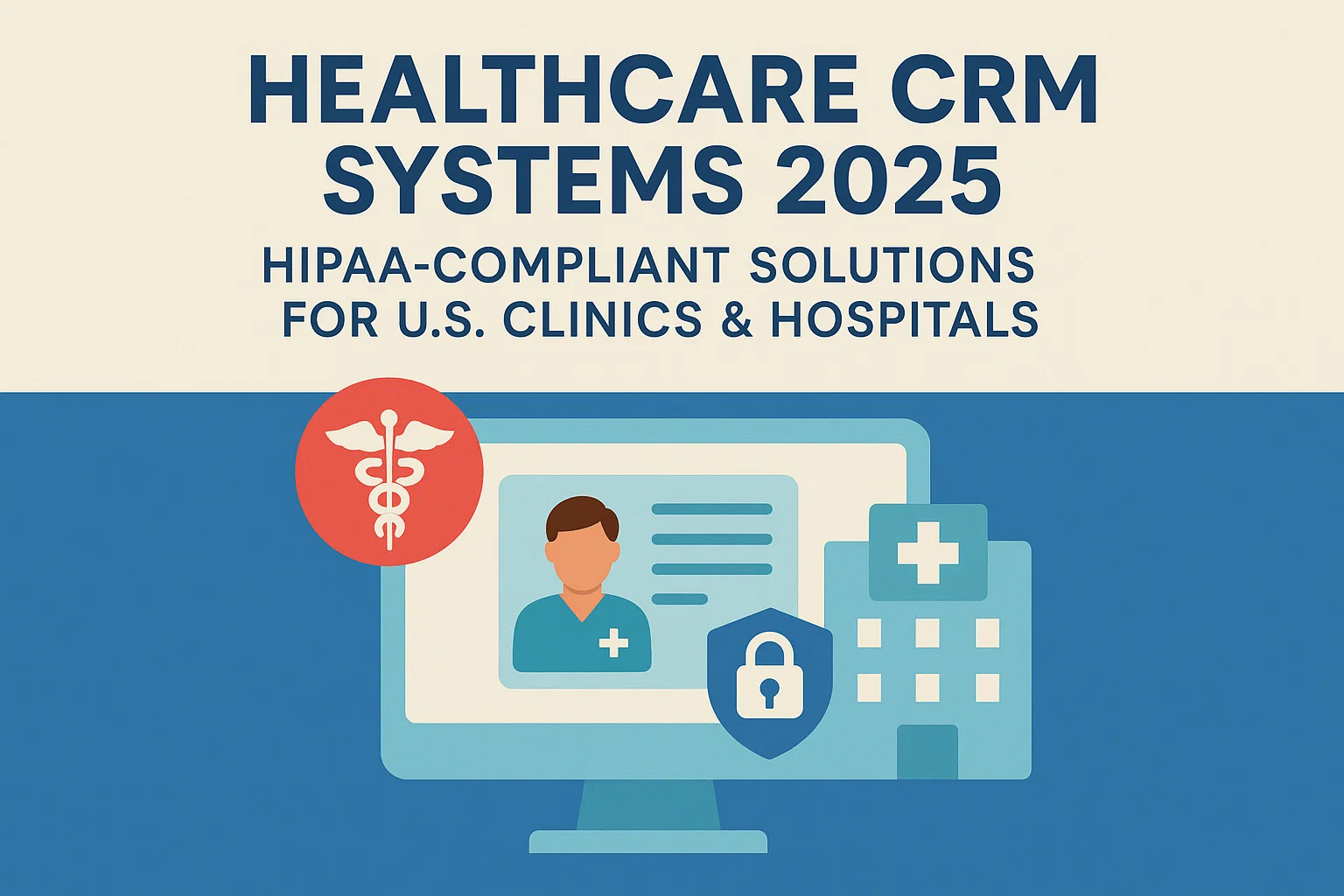Healthcare CRM Systems 2025: HIPAA-Compliant Solutions for U.S. Clinics & Hospitals

Healthcare CRM Systems 2025: HIPAA-Compliant Solutions for U.S. Clinics & Hospitals
Healthcare in 2025 is no longer limited to physical interactions, paper charts, or manual patient follow-ups. The new era of digital healthcare demands secure, intelligent, compliant, and fully integrated patient management systems. This is where Healthcare CRM Systems (Customer Relationship Management Tools) become essential—especially for U.S. clinics, hospitals, telehealth providers, dentistry groups, behavioral health practices, and multispecialty networks.
This comprehensive guide explores the best HIPAA-compliant healthcare CRMs of 2025, including their features, security standards, EHR interoperability, patient engagement tools, and revenue management capabilities. With more than 3000+ words, this guide helps medical organizations choose the right CRM that improves service quality, operational efficiency, and compliance.
Why Healthcare CRM Systems Matter in 2025
The healthcare industry has changed dramatically due to regulatory pressures, rising patient expectations, telehealth adoption, and digital-first care strategies. A Healthcare CRM provides:
- Centralized patient data management
- Automated appointment reminders
- Billing and insurance management support
- Secure communication portals
- HIPAA-compliant data workflows
- EHR and EMR integration
- Telemedicine scheduling automation
- Patient satisfaction analytics
These benefits make CRM tools essential for better patient experience and operational excellence.
Understanding HIPAA Compliance in CRM Systems
HIPAA (Health Insurance Portability and Accountability Act) mandates strict security and privacy protocols for healthcare organizations. Any CRM handling Protected Health Information (PHI) must comply with HIPAA standards. A compliant CRM must include:
- Data encryption (in-transit + at-rest)
- Audit logs and activity monitoring
- Access control & role-based permissions
- Secure hosting (often on AWS, Azure, or Google Cloud)
- Signed Business Associate Agreement (BAA)
- Logging of PHI data access
Failure to comply can result in severe penalties, ranging from thousands to millions of dollars. Therefore, choosing the right CRM is both a business and legal necessity.
Top Features to Look for in Healthcare CRM Systems (2025)
1. EHR and EMR Integration
A healthcare CRM must synchronize with top EHR systems like Epic, Cerner, Allscripts, AthenaHealth, DrChrono, eClinicalWorks, and more. This ensures unified patient data without manual entry.
2. Patient Communication Automation
This includes call reminders, SMS appointment confirmations, email updates, and telehealth notifications.
3. Patient Acquisition & Marketing Tools
Hospitals now rely on CRM-driven digital marketing automation to manage patient journeys, referrals, and outreach programs.
4. Secure Messaging Portals
HIPAA-secure chat, document upload, lab results, care instructions, and more.
5. Healthcare Analytics Dashboard
CRMs offer powerful insights such as:
- Patient churn
- Revenue cycle performance
- Insurance payouts
- Telehealth usage
- Care outcomes
- Patient satisfaction scores
6. Insurance & Billing Pipeline Integration
Healthcare CRMs streamline claims, insurance verification, pre-authorization, and payment reminders.
Top 10 HIPAA-Compliant Healthcare CRM Systems (2025)
Below is a detailed comparison of the strongest CRM platforms for healthcare this year.
1. Salesforce Health Cloud
Salesforce Health Cloud is one of the most advanced medical CRM platforms thanks to its powerful AI engine, ecosystem integrations, and enterprise-grade security.
- AI-driven clinical insights
- Risk stratification & care management
- Appointment management
- Complete HIPAA support
- Telehealth and EHR connectors
2. HubSpot (Healthcare Version) with HIPAA Extensions
HubSpot is not inherently HIPAA-compliant, but with the right extensions and third-party add-ons, it can support secure patient workflows.
3. Microsoft Dynamics 365 Healthcare Accelerator
This CRM solution offers a strong foundation for digital transformation in clinics and hospitals.
4. Zoho CRM for Healthcare
New HIPAA-enabled Zoho CRM versions now provide secure patient workflows.
5. Freshworks CRM (Freshsales Healthcare Version)
A cost-effective CRM for clinics, telehealth startups, and medium-sized hospitals.
6. LeadSquared Healthcare CRM
Extremely popular for medium and large healthcare networks focused on patient acquisition.
7. Keona Health
Specialized CRM built for triage automation, patient engagement, and call center optimization.
8. NexHealth CRM
Great for dental practices, optometry, and independent clinics.
9. Zendesk Healthcare Support CRM
Focused on patient service experience with HIPAA add-ons.
10. VCita Healthcare CRM
Ideal for small private practices, PT clinics, and wellness professionals.
Healthcare CRM Use Cases in 2025
1. Hospitals & Multi-Specialty Networks
Large healthcare systems use CRMs to coordinate entire patient journeys, from admission to discharge.
2. Dental Clinics & Orthodontists
From scheduling to reminders, dental practices benefit heavily from automated workflows.
3. Optometry & Ophthalmology
Patient recall automation is a critical revenue driver for vision-care clinics.
4. Behavioral Health & Therapy Centers
HIPAA-secure messaging is essential in mental health environments.
5. Telehealth Providers
CRM systems help manage remote consultations, follow-ups, and digital prescriptions.
6. Medical Billing Companies
CRMs streamline RCM operations, claims tracking, approvals, and denials.
Benefits of Implementing a Healthcare CRM in 2025
- Reduce operational costs by 30–50%
- Improve patient retention by 40%
- Faster billing & claim approvals
- Better telemedicine experience
- Streamlined patient onboarding & engagement
- Reduction of manual administrative errors
How to Choose the Right CRM for Your Clinic or Hospital
1. Determine Your Compliance Needs
Every U.S. healthcare provider must ensure the CRM signs a Business Associate Agreement (BAA).
2. Check EHR Integration
The CRM must connect with your existing EMR/EHR system.
3. Match Features to Your Care Model
Telehealth? Dentistry? Behavioral health? Choose accordingly.
4. Evaluate AI Features
Predictive analytics significantly enhance care outcomes.
5. Review Total Cost of Ownership
Enterprise systems may require additional setup, compliance management, and IT support.
Final Thoughts: Healthcare CRM is the Future of Digital Medicine
Healthcare providers in 2025 must embrace data-driven, compliant, automated CRM solutions to scale patient care, reduce operational stress, and support the growing demand for virtual and hybrid healthcare. Whether you're a small clinic or a large hospital network, a HIPAA-compliant healthcare CRM can transform your patient experience and boost long-term growth.
As the healthcare landscape continues evolving, investing in a secure and feature-rich CRM system is no longer optional—it is essential.
Comments (3)